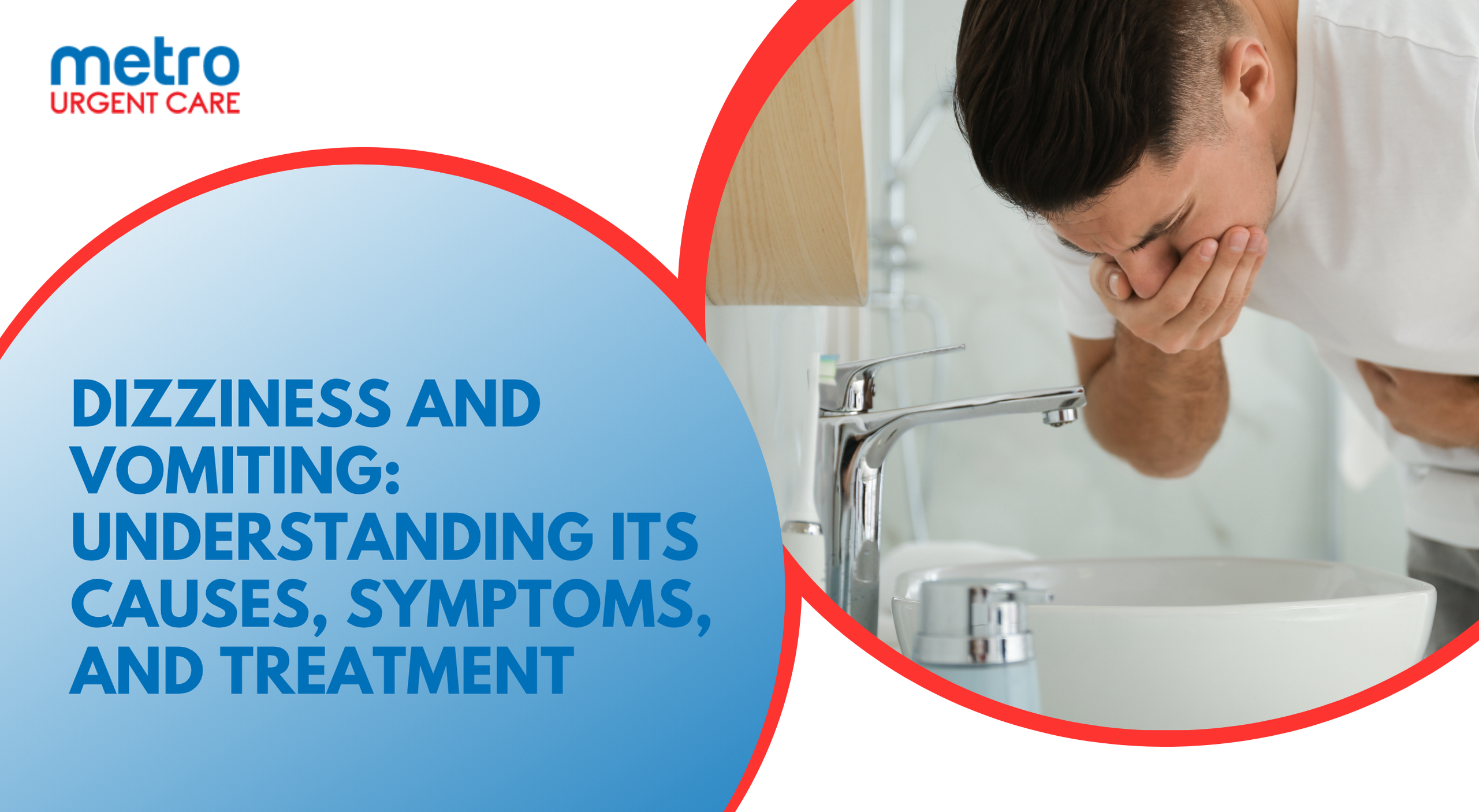


Dizziness is a disturbing symptom that describes a range of sensations like lightheadedness, wooziness, weakness, or disorientation, as if the surroundings are spinning. On the other hand, vomiting is forceful, throwing up all your stomach content through your mouth.
Usually, dizziness and vomiting happen together, causing a temporary concern in most people. However, if they are recurring or persistent, seek immediate medical attention as they may cause far more illnesses. Dizziness symptoms burden 15% to 20% of adults annually, leading to approximately 7.5 million people seeking medical evaluation each year.
So, in this blog, we will explore sudden causes of dizziness and vomiting in women and men, including symptoms and preventive strategies.
Dizziness, characterized by lightheadedness and unsteadiness, often accompanies nausea and vomiting. It can result from any of these factors, from simple motion sickness to migraine headaches, reduced blood flow, or side effects from certain medications.
Understanding the potential causes is important for proper diagnosis and treatment. So here are some of the common causes:
The ear structure sends information to the brain, enabling the body to sense motion and position. Disorders in these structures can cause sudden dizziness and nausea, sometimes causing decreased hearing and a ringing sound in the ear.
According to a research, migraine affects 1 out of every 6 Americans and it is one of the most prevailing causes of dizziness. People with migraine often feel nauseous and dizzy out of nowhere, sometimes with sensitivity to light or sound. This can last from minutes to several hours.
Medications used to lower your blood pressure might make you feel dizzy and nauseated if they lower your blood pressure too much.
Experiencing persistent or sudden dizziness and vomiting might be a matter of concern. Dizziness and vomiting symptoms may include the following sensations:
A false sense of motion or spinning of you or your surroundings, often linked to vertigo vomiting if severe. The symptoms usually go on their own, however, see a doctor if this symptom is severe or prolonged.
An uneasy feeling in your stomach can often escalate to episodes of feeling dizzy and throwing up.
Dizziness striking with sweating is a serious problem that may be happening due to some serious health conditions.
Other vomiting and dizziness symptoms may include:
Determining the reasons for dizziness and nausea involves several steps to confirm the underlying factor. Here are the critical points in the diagnostic process:
Evaluation of past medical history to understand the health concerns and medications you are taking.
A thorough physical examination, including vital signs, eye movements, and blood pressure, is performed.
Blood tests, urinalysis, and imaging such as CT or MRI scans are done if something serious is suspected.
A complete brain imaging is done if any neurological or lifestyle changes are diagnosed.
This differential diagnosis helps healthcare providers spot the source and ensure an effective and tailored treatment plan to address the underlying cause of your dizziness and vomiting symptoms.
Treatment options for dizziness and vomiting vary based on the severity and symptoms but typically include:
Antihistamines, antiemetics, and vestibular suppressants to manage symptoms.
Head position maneuvers, balance therapy, and psychotherapy to alleviate dizziness and associated symptoms.
Avoiding triggered substances, practicing stress-reduction techniques, and breathing exercises.
In severe cases, procedures like antibiotic injection or removal of inner ear sense organs may be recommended.
Quick precaution and management strategies are essential to ease discomfort and prevent complications of dizziness and vomiting:
Proper rest, maintaining a comfortable position, and sipping water can ease dizziness.
Improves balance and reduces the symptoms over time.
Certain drugs or antibiotics your healthcare provider prescribes are effective in treating symptoms like dizzy throwing up and nausea.
If symptoms are accompanied by chest pain or difficulty speaking, seek immediate medical attention.
Dizziness and vomiting arising from various underlying causes can be distressing or disruptive and significantly impact one’s life. Understanding its causes, and treatment options is crucial for effective management. While lifestyle changes and medical interventions play a key role, each case may require a unique treatment plan. Seek medical help if the symptoms persist, or if you experience unexplained issues like feeling nauseous and dizzy out of nowhere.
If you're dealing with recurring episodes of dizziness and vomiting, Metro Urgent Care in (Montrose & Fullerton) Chicago and La Grange, IL, is here to help. Our experienced medical team specializes in diagnosing and treating nausea, vomiting, diarrhea symptoms, and related discomforts with prompt, personalized care. We are always ready to provide immediate attention and assistance, focusing on identifying the root cause to ensure effective relief and long-term well-being.
When Answers Can't Wait—Turn to Metro Urgent Care! Walk in or reach out today to get the care you need and start feeling like yourself again.
Contact us today to schedule an appointment and lead a comfortable life.